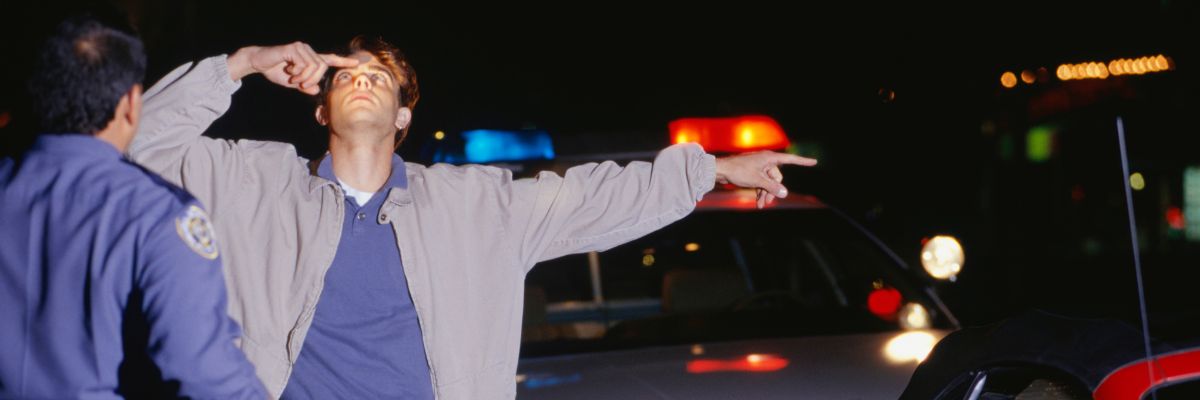Three Tips When Stopped for DWI
- Shut up
a. Alcohol is released from the breath. The more you talk, the stronger the smell
b. Control the factors you can: Breath & Speech - Don’t move
a. Field Sobriety Test: should you refuse? Probably
i. Always refuse HGN: subjective, partially inadmissible=unreliable,
ii. 1 Leg Stand: hold one leg up for approx. 30 seconds, hands at sides
iii. Walk & Turn: very difficult, even without alcohol in system
iv. Alco-Sensor: portable breath test on the roadside, number not admissible - Delay
a. Alcohol dissipates from your system at approx. .01 per hour
b. FST’s=time before test, only reason to take is to delay breath testing
c. witness=30 min delay, absolute right to have witness present
DWI convictions are based on the evidence the officer collects from the traffic stop. The key to defending a DWI charge is reducing the evidence or clues of impairment for the officer to testify about in court. The driver has control of only a few of the factors of impairment.
The smell of alcohol coming from a driver is often the first thing an officer will notice when interacting with a driver. The officer may suspect an impaired driver, but the smell of alcohol is the first tip that the source of the impairment is alcohol.
Alcohol is excreted from our skin and breath. Anyone who has smelled their skin after a big night of drinking can attest to the smell oozing from the pores. While sometimes the smell can come from drinks spilled on the skin, it is also being excreted through sweat. Open the windows to flush the smell from the interior of the car. If weather inappropriate for open windows, try the a/c. If wearing clothing that has alcohol spilled on it, put in the trunk prior to driving.
Officers are trained to ask questions of suspected DWI drivers. Slurred speech is noted so often on DWI Reports that it should be pre-printed on the form. The less you talk, the less opportunity for the officer to note slurred speech. Ideally, the driver would say nothing. However, remaining completely mute is unlikely.
A driver is permitted to politely state that they would rather not answer any questions. The officer will probably continue to talk, hoping the driver will speak, but the driver can legally remain silent. The less the driver speaks, the less evidence of slurred speech and breath.
The officer will ask the driver to exit the vehicle to perform roadside Field Sobriety Tests (FST). The standard tests are the One Leg Stand, Walk & Turn, HGN, and PBT. A driver can legally refuse the roadside field sobriety without consequence. This is different from refusing a blood or breath test. The distinction is important to remember.
Before taking the test, the driver will need to do some honest self-reflection. If the driver thinks there is any possibility of blowing over .08, or is planning on refusing to cooperate with breath or blood testing, the driver should simply say no or shake their head when requested to perform roadside tests. This also applies to any physical test at the station other than blood or breath. No explanation is required.
Even, if the driver chooses to take the walk and turn and one leg stand, do not “follow the officer’s finger or pen with your eyes.” This is the HGN or Horizontal Gaze and Nystagmus test. This test is incredibly subjective and unverifiable. The other FST’s depend on large movements of the body which can be documented by camera equipment. HGN is based on small movements of the eyes at unmeasurable degrees which the officer testifies about in court. There is no way to verify this information in court other than the officer’s recollection and testimony. The driver can only be hurt by participating with this test.
When the officer starts holding a pen or single finger in front of the drivers eyes, a shake of the head or verbal no is enough. If the driver decides to perform the roadside tests, remember that there is no “passing” the tests. There are clues of impairment which are present or absent. Most drivers should refuse to take these tests.
One advantage to participating with the test is that it delays the ultimate test, the breath measurement. The human body processes alcohol at a steady rate through metabolism. This cannot
be controlled by the drinker. The breath test measures the amount of alcohol present in the breath. Time between last drink and breath test determines the level of alcohol present in the breath.
Any tests performed on the roadside will delay the administration of the breath test. Once at the station, the officer administering the breath test is required to follow test protocol. The officer will ask the driver a lot of questions. The driver is required to confirm biographical data such as address and license information, but that is all.
The officer will likely ask questions about the driver’s activities prior to the traffic stop. Again, polite refusal is the recommended behavior.
The driver is allowed to have a witness present for the administration of the breath test. The driver is allowed to delay the test for thirty minutes. When asked if the driver would like to have a witness present, always say yes. Even if the driver cannot reach a witness when given an opportunity to call, do not give away your time. Every minute delay is precious.
DWI convictions are based on an accumulation of evidence. Control the evidence that you can. Exercise your rights. Shut up, don’t move, and legally delay is the key to a good DWI defense.





